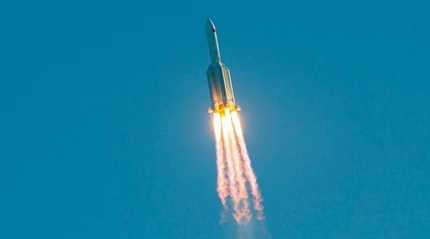
SEOUL, May 25 (Xinhua) -- South Korea launched its homegrown space rocket on Thursday to carry eight satellites into orbit, marking the country's second successful rocket launch.
The Korea Space Launch Vehicle (KSLV)-II, also dubbed Nuri, blasted off from the Naro Space Center in the southern coastal village of Goheung at about 6:24 p.m. local time (0924 GMT), live footage from the Korea Aerospace Research Institute (KARI) showed.
The three-stage rocket completed its first-stage separation about two minutes after blastoff and reached the target altitude of 550 km at around 6:37 p.m. (0937 GMT), separating the satellites one by one every 20 seconds.
Following the separations, the third-stage booster flew more and its engine stopped at 6:42 p.m. (0942 GMT).
It marked the second successful launch of the Nuri rocket after the second attempt succeeded in June last year to put a dummy satellite and a performance verification satellite into orbit.
The first Nuri test-launch failed in October 2021 when the rocket reached a target altitude of 700 km but failed to put a dummy satellite into orbit as its third-stage booster engine burned out earlier than planned.
The East Asian country invested nearly 2 trillion won (1.5 billion U.S. dollars) over the past decade to indigenously develop the space launch vehicle capable of deploying a 1.5-ton practical satellite into the low-Earth orbit.
The Nuri rocket was clustered by four 75-ton-grade liquid engines in the first stage, one 75-ton-grade liquid engine in the second stage, and one 7-ton-grade liquid engine in the third stage.




